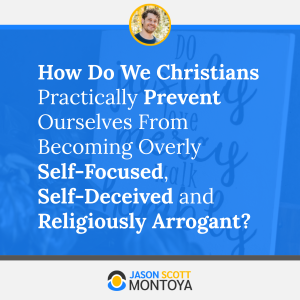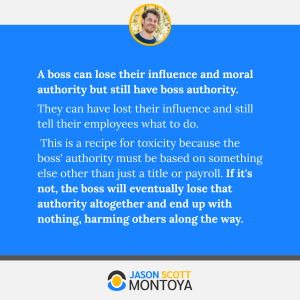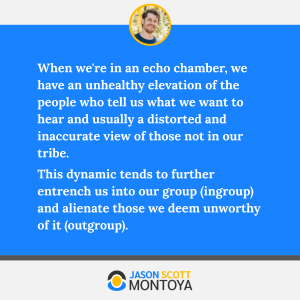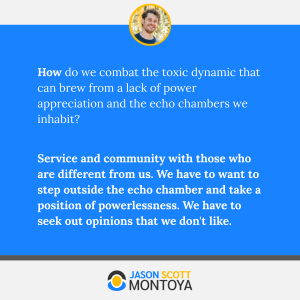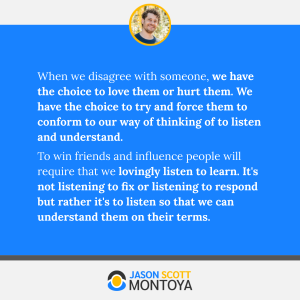
How Do We Christians Practically Prevent Ourselves From Becoming Overly Self-Focused, Self-Deceived and Religiously Arrogant?
"The purpose of propaganda is to make one set of people forget that other sets of people are human." - Aldous Huxley
Outside the obvious answers — reading scriptures, devotionals, prayer, and church participation — I want to inject some nonobvious insights into the matter of solving the problems highlighted in my headline.
Quickly, here are the answers.
- Serving Others
- Friendship & Community With People Who Hold Diametrically Different Perspectives
- Respectfully Listening to Learn Instead of Dominating (Forcing Others To Conform To Us)
These ideas for serving, seeking truth, and embracing humility, should become standard for any of us Christians (or those who want to tackle their blind spots) who are not already embodying them.
But first, before I go into detail about them, let me share the two dangers that make these ways of life necessary.
The two dynamics that can delude us are when we operate solely from a position of power and when we stay inside our echo chambers.
Power Play
When we have power, we can usually get what we want. For example, if we own a business and are the boss, we can tell an employee what to do. The employee will have to do what his or her boss says or risk losing their job. That same person in power is now used to people doing what they say.
Now imagine they are in a friendship with someone difficult. They don't have that same power and must earn moral authority and influence from their friend to have them change their behavior (this is the difference between authority and influence).
Moral authority (influence) is earned by example so there is a tension to become the ideal so that we can positively influence others.
A boss can lose their influence and moral authority but still have boss authority. They can have lost their influence and still tell their employees what to do. This is a recipe for toxicity because the boss' authority must be based on something else other than just a title or payroll. If it's not, the boss will eventually lose that authority altogether and end up with nothing, harming others in their downward spiral.
When this happens, the downward spiral tends to drive the boss to hold on more tightly (instead of letting go) leading to a much worse outcome for them and the last loyalists.
When we lose sight of power's foundation, our attitude and behavior get distorted, which can lead to us losing that power. The loss of influence is usually a good leading indicator of this dynamic unfolding.
Echo Chambers
In tandem with the isolating effect of power without an appreciation for its foundation, echo chambers operate the same way.
We humans love to hear what tickles our ears (even when it's a lie). We like feeling that we're right.
And, it's scary to hear and seek out information that may challenge our deeply held beliefs and force a conflict in our social circles. Often, we want to shore up what we do believe by doubling down.
Sometimes going into our cocoon isn't a problem as long as the cocoon involves values and community that will push us out of it when appropriate. When that's not the case, we can get entrenched and feel a sense of being under siege.
When we're in an echo chamber, we have an unhealthy elevation of the people who tell us what we want to hear and usually a distorted and inaccurate view of those not in our tribe. This dynamic tends to further entrench us into our group (ingroup) and alienate those we deem unworthy of it (outgroup).
I'm reminded of Martin Luther King Jr.'s words.
“I am convinced that men hate each other because they fear each other. They fear each other because they don’t know each other, and they don’t know each other because they don’t communicate with each other, and they don’t communicate with each other because they are separated from each other”
Often, for the echo chamber bubble to burst requires that someone inside our group speak out, the world of that person to fall apart, or for the group to disband.
Accountability and A Collective of Difference
How do we combat the toxic dynamic that can brew from a lack of power appreciation and the echo chambers we inhabit?
Service and community with those who are different from us. We have to want to step outside the echo chamber and take a position of powerlessness. We have to seek out opinions that we don't like.
These were embodied and encouraged by Jesus. Let's dive into each.
1. Serving Others
There are numerous ways we can serve our spouse, our family, and our community. Serving other people through our church and community is a way for us to step into a role of service, to be someone subordinate to others in positions of authority. It's how we learn to be a good son or daughter of God or a good follower or helper.
Bonus points for serving the type of people you like the least and have the hardest time being alongside.
2. Friendship & Community With People Who Hold Diametrically Different Perspectives
If l you don't have relationships and community with people who are deeply different than you, you're missing out and possibly (unknowingly and subtly) fostering toxic dynamics.
Outside of our call to evangelize, which requires understanding those were evangelizing to, we also are called to grow and mature in our faith. Having the following types of relationships is transformative and fosters the type of accountability we need to be virtuous Christians.
Those with...
-
Differing political views and tribes
-
Differing religious views and tribes or subtitles
-
Differing worldviews (those who believe in God and those who don't)
-
Differing positions of power
As someone who has stepped outside of my bubble and engaged in relationships and community in these categories, I now see much broader than I did before. I have a deeper understanding and compassion for those unlike myself. It reveals how incomplete I am, and how much more there is to participate in.
And, stepping outside my bubble makes it more obvious when I speak with people still inside their bubbles. They speak about people in other groups with which I'm friends while having no clue that what they are saying is completely distorted.
Christians should lead the way in these outreach activities and if they are not there is a potential issue.
If a Christian...
-
is not talking to other people unlike themselves or in contradiction to their way of life (atheists and agnostics)...
-
is not able to make an argument for their faith that appeals to different worldviews...
-
is not able to make a strong argument for their rival's political (or religious) views (such that they'd be compelled to adopt it themselves)...
-
is not able to lovingly engage with someone of a drastically different perspective without becoming a jerk face and treating the other person poorly...
-
is not able to submit under the authority of another (when it's not a morally problematic directive)...
Then they're missing some important facets of their Christian way of life.
For mature Christians, these are warning indicators that they are vulnerable to losing their way as a Christian and becoming the opposite of what Christ called us to be.
Relationships with people who are different than us foster accountability and development. They help keep us on our toes and sharpen our character and communication. And we also have something to learn from each other, even those we look down upon.
Conversations and friendships with people who adhere to other religions (or reject them all) or denominations are fruitful and necessary for evangelism. As Christians, I believe we are called to do this. But also, it's a practical way for God to shape us in his image instead of us shaping God in our image.
This way of life does require a commitment to truth because it will require us to let go of ideas and ways of life that are antithetical to the way of Jesus. Sometimes the only way we see it is when an atheist, Muslim, or Democrat points out our blind spot.
3. Respectfully Listening to Learn Instead of Dominating (Forcing Others To Conform To Us)
When we disagree with someone, we have the choice to love them or hurt them. We have the choice to try and force them to conform to our way of thinking of to listen and understand.
To win friends and influence people will require that we lovingly listen to learn. It's not listening to fix or listening to respond but rather it's to listen so that we can understand them on their terms.
This is not just something I share with you, but also a good reminder of myself. Sometimes we lose our way and need encouragement back to the value. As much as I value listening, even I forget and lose my way.
Not shutting them down and pushing them away but listening to learn. It sometimes means accommodating the less mature by filling the gap towards truth, reconciliation, and restoration. It might mean we have to help them make their argument if they're struggling. It might require our forgiveness for them when they're frustrated and act with hostility.
Ultimately, our time with that person should result in us understanding that person so accurately that we can advocate for that person even better than they can themselves. If you mirror back to them their point of view and they say you've stated it better than they could themselves, you've achieved success at listening to learn.
Wrapping Up
Power and echo chambers can foster environments where our Christian way of life is distorted.
When we choose to serve others, engage in difficult and different relationships, and listen to learn, we'll embody the way of Jesus and be a model of the way of life we Christians want everyone to voluntarily embrace.
If we have good news, it should be good for those who do life with us, including those who choose a different way of life.
Share With Your Friends & Family
- Created on .
- Last updated on .
